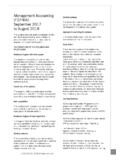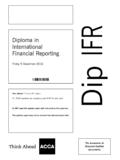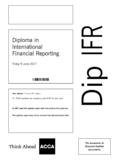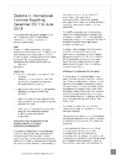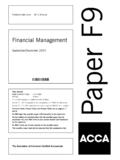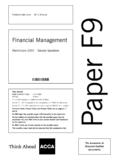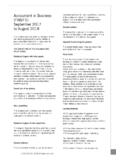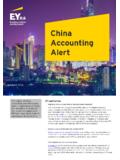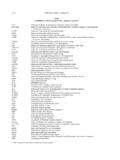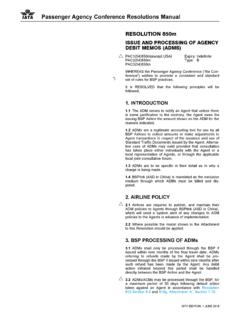Transcription of International Variations in IFRS Adoption and …
1 Research report 124. International Variations in ifrs Adoption and Practice International Variations in ifrs Adoption and Practice Professor Christopher Nobes Royal Holloway, University of London Certified Accountants Educational Trust (London), 2011. ACCA's International research programme generates high-profile, high-quality, cutting-edge research. All research reports from this programme are subject to a rigorous peer-review process, and are independently reviewed by two experts of International standing, one academic and one professional in practice. The Council of the Association of Chartered Certified Accountants consider this study to be a worthwhile contribution to discussion but do not necessarily share the views expressed, which are those of the author alone. No responsibility for loss occasioned to any person acting or refraining from acting as a result of any material in this publication can be accepted by the author or publisher.
2 Published by Certified Accountants Educational Trust for the Association of Chartered Certified Accountants, 29 Lincoln's Inn Fields, London WC2A 3EE. ISBN: 978-1-85908-473-1. The Association of Chartered Certified Accountants, 2011. Contents Abbreviations 4. Executive summary 5. 1. Introduction 7. 2. International differences before ifrs 9. 3. Grouping countries and accounting systems 14. 4. How countries react to ifrs 16. 5. Different national patterns of ifrs practice 21. 6. National patterns on transition to ifrs 25. 7. Have national patterns persisted? 31. 8. Country groups and national patterns of ifrs 33. 9. Does size matter? 35. 10. Conclusions 36. References 38. International Variations IN ifrs Adoption AND PRACTICE 3. Abbreviations ACCA Association of Chartered Certified Accountants AGL actuarial gains and losses ASB Accounting Standards Board ASX Australian Stock Exchange index AVCO average cost BRIC Brazil, Russia, India and China CAC French Stock Exchange index DAX German Stock Exchange index DC dominated culture EU European Union FIFO first in, first out FPI foreign private issuer FRRP Financial Reporting Review Panel FTSE Financial Times Stock Exchange index GAAP generally accepted accounting principles HGB Handelsgesetzbuch (German Commercial Code).
3 IAS International Accounting Standard IASB International Accounting Standards Board IASC International Accounting Standards Committee IBEX Iberian Stock Exchange index IFRIC International Financial Reporting Interpretations Committee ifrs International Financial Reporting Standards JV joint venture LIFO last in, first out OCI other comprehensive income PPE property, plant and equipment SCE statement of changes in equity SEC Securities and Exchange Commission SMEs small and medium-sized entities (or enterprises). SORIE statement of recognised income and expense SSAP Statement of Standard Accounting Practice SSC self-sufficient financial and legal culture 4. Executive summary This report is designed to investigate the degree to which amendments and then insert the result into law. All these financial reporting remains different, by country, even methods (apart from simply imposing ifrs ) need within the area of the world that has apparently adopted continual attention from regulators.
4 Divergences from ifrs . International Financial Reporting Standards ( ifrs ). The can emerge, not least in the timing of Adoption of differences between countries can be divided into two amendments and new standards. Auditors do not always main types: (i) the degree to which ifrs has been report on compliance with ifrs as issued by the IASB'. mandated or allowed for particular companies or types of even when this is being achieved. reporting, and (ii) the degree to which the practice of ifrs . differs along national lines. These two issues are closely The two-type classification can be used to explain and linked because of the underlying forces that have caused predict which countries will allow ifrs for unconsolidated the long-running accounting differences between reports. In Europe, only those with a history of strong countries. equity markets allow ifrs for this purpose.
5 This is because such countries have tax accounting that is, for many International differences in financial reporting create topics, separate from financial reporting. Therefore, ifrs . problems because many users (eg investment analysts can be used in such countries without upsetting tax acting for investors in equity or debt) assess companies on calculations. a comparative basis internationally. Reconciliations from one set of generally accepted accounting principles (GAAP) Several major countries have not yet moved to ifrs even to another (especially to US GAAP) were common until for listed companies Brazil and Canada are adopting 2007, and they revealed significant differences between ifrs , at least for listed companies in 2010 and 2011. countries. A standard reporting system for listed respectively. It seems unlikely that China or Russia will fully companies would address these problems.
6 There would be adopt ifrs in the near future. The US might partially adopt disadvantages if the whole world had to adopt US GAAP. ifrs for 2014 or later; Japan possibly for 2016. Therefore, ifrs have been developed instead. Some of the factors that led to pre- ifrs International A large number of explanations have been offered for accounting differences can still influence ifrs practices. differences in the accounting systems of different For example, there is still scope for tax influence to feed countries. One model (suggested by the author) is that, through from non- ifrs unconsolidated statements to ifrs . unless one country is dominated by another, a national group statements. accounting system will be largely determined by the predominant type of financing and owners of companies There are many opportunities for ifrs practices to differ (and, therefore, by the predominant users of financial from company to company or from country to country.)
7 For reporting). The model can be used to predict how a example, different versions of ifrs arise because most country's (or a company's) reporting will change as its countries introduce delays or changes when implementing corporate financing changes. This is especially relevant for ifrs ; in addition, there are options within ifrs . For several countries in transition from Communism. In addition, it is reasons, it can be expected that a company will continue now clear that one country (and even one company) can with many of its previous accounting policy choices when use more than one system simultaneously for different it first adopts ifrs . This report lists 13 policy choices and purposes. makes predictions about which choices would be made under ifrs in five countries: Australia, France, Germany, This report shows that each accounting system can be Spain and the UK.
8 The actual policy choices made by large classed as being one of two main types, on the basis of the listed companies in these five countries for 2005 are then differential strength of equity markets. For example, one recorded. There is statistically strong evidence that pre- type of accounting ( ifrs or US GAAP) is needed by large ifrs national practices have continued. The national listed groups for reporting to International investors; the patterns of ifrs practice are set out in order to help users, other type (eg French accounting) is relevant to small preparers and auditors to appreciate the differences and private companies for reporting and tax accounting. to compare annual reports. The International Accounting Standards Board (IASB) has The policies for the same countries and companies are no authority to impose ifrs on companies, and the examined again in 2008.
9 The report shows that there had reactions of different jurisdictions to ifrs differ greatly. been few policy changes since 2005 and, therefore, the Some have ignored it, some have allowed it; some have national patterns remain. One major change did occur required ifrs for some purposes, whereas others have between 2005 and 2008: Continental companies moved abolished national GAAP in favour of ifrs . Very few to the UK practice of charging actuarial losses to other jurisdictions have simply imposed ifrs as issued by the comprehensive income (and, incidentally, they therefore IASB, although some countries (eg Canada) do incorporate had to present a statement of such income). ifrs into law without amendment. Others make International Variations IN ifrs Adoption AND PRACTICE EXECUTIVE SUMMARY 5. A classification of countries by their ifrs practices reveals the same two-group model ( Anglo' versus Continental European) as seen in earlier classifications of national practices.
10 The number of ifrs policy changes, from 2005. to 2008, also differs between these two country groupings. Continental companies changed their policies much more extensively after the transition to ifrs than did Anglo ones. No underlying economic justifications could be discerned for the continuing International differences in ifrs policies. Taking Germany as an example, this report shows that small listed companies choose significantly different ifrs . policies from the largest companies. The smaller companies are more inclined to continue their traditional practices. This report recommends that jurisdictions should consider adopting the IASB's process rather than producing national versions of ifrs . If the latter must be done, then auditors should still be required to give an opinion on ifrs as issued by the IASB' where that is the intended result in the jurisdiction.
